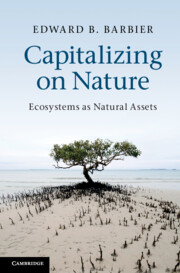Book contents
- Frontmatter
- Contents
- Figures
- Tables
- Boxes
- Acknowledgments
- Introduction
- 1 Ecological scarcity as an economic problem
- 2 Ecosystem services and ecological landscapes
- 3 The basic natural asset model
- 4 Spatial variation in ecosystems
- 5 The open economy
- 6 Ecological collapse
- 7 The way ahead
- 8 Policies in the Age of Ecological Scarcity
- Index
- References
1 - Ecological scarcity as an economic problem
Published online by Cambridge University Press: 05 June 2012
- Frontmatter
- Contents
- Figures
- Tables
- Boxes
- Acknowledgments
- Introduction
- 1 Ecological scarcity as an economic problem
- 2 Ecosystem services and ecological landscapes
- 3 The basic natural asset model
- 4 Spatial variation in ecosystems
- 5 The open economy
- 6 Ecological collapse
- 7 The way ahead
- 8 Policies in the Age of Ecological Scarcity
- Index
- References
Summary
The fundamental scarcity problem … is that as the environment is increasingly being exploited for one set of uses (e.g., to provide sources of raw material and energy, and to assimilate additional waste), the quality of the environment may deteriorate. The consequence is an increasing relative scarcity of essential natural services and ecological functions … In other words, if “the environment is regarded as a scarce resource,” then the “deterioration of the environment is also an economic problem.”
(Barbier 1989, pp. 96–97)Introduction
One of the most critical problems facing humankind today is the rapid disappearance and degradation of many ecosystems worldwide. The key question is: How can we humans allow the continued overuse and destruction of nature, which is so essential to life and valuable? A pertinent reply is:
We are using natural capital because it is valuable; the reason we are losing natural capital is it is free.
Such a reply conveys an important economic view of the global problem of environmental loss: the basic unit of nature – the ecosystem – is a special form of wealth, which we can think of as a stock of natural capital. Humans depend on and use this natural capital for a whole range of important benefits, including life support. Hence, our ecological wealth is extremely valuable. But unlike skills, education, machines, tools, and other types of human and human-made capital, we do not have to manufacture and accumulate our endowment of natural assets. Nature has provided ecosystems and their benefits to us for free. However, perhaps because this capital has been provided freely to us, we humans have tended to view it as limitless, abundant, and always available for our use, exploitation, and conversion. The concept of an ecosystem as natural capital can help us analyze the economic behavior that has led to the overuse of so much ecological wealth. If we can understand this behavior better, then perhaps we can also find ways to manage and enhance what is left of our natural endowment.
- Type
- Chapter
- Information
- Capitalizing on NatureEcosystems as Natural Assets, pp. 6 - 25Publisher: Cambridge University PressPrint publication year: 2011



